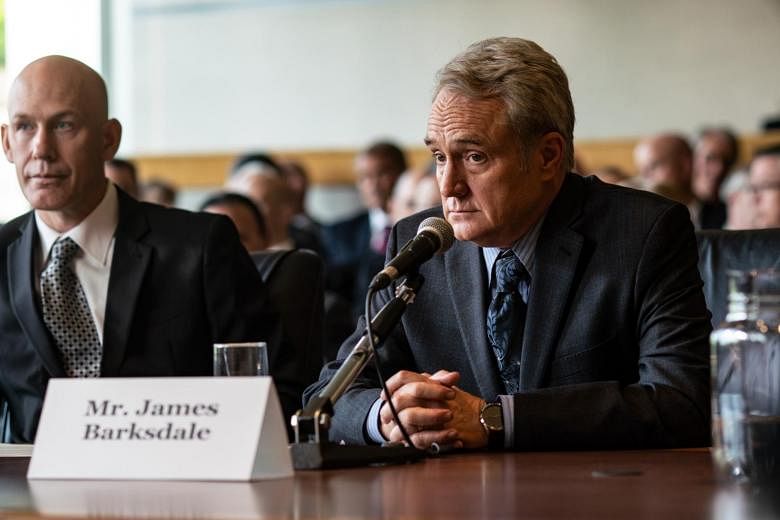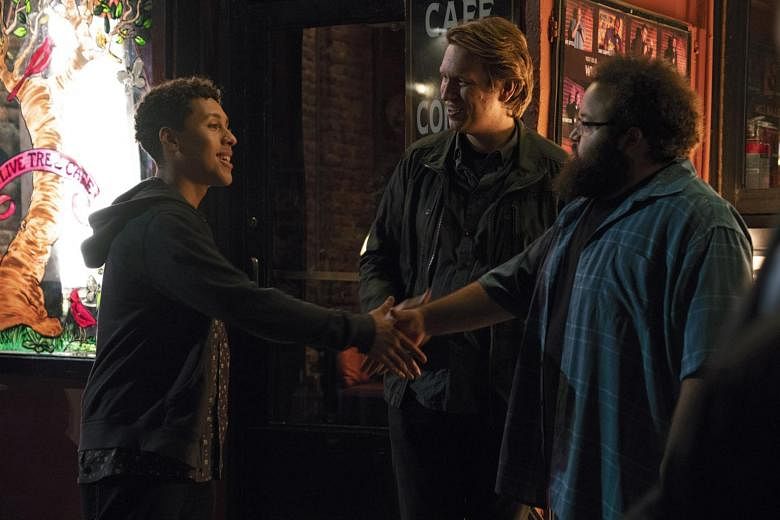VALLEY OF THE BOOM
Sundays at 10pm on National Geographic (Singtel TV Channel 201 and StarHub TV Channel 411, also streaming on Fox+)
3 out of 5 stars
CRASHING SEASON 3
Mondays at 11am and 11pm on HBO (StarHub TV Channel 601), HBO Go and HBO On Demand (StarHub TV Channel 602)
3 out of 5 stars
There are good reasons the unlovely term "edutainment" never caught on - one of them being the instant turnoff many feel when they sense a piece of entertainment is trying to teach them something.
So Valley Of The Boom, the National Geographic channel's mash-up between a scripted series and documentary, has its work cut out for it.
It is an origin story of the Internet which revisits the gold rush of Silicon Valley's 1990s dotcom boom and bust - those heady days when no one quite knew what the Net was, investors threw grotesque sums of money at it, and startups threw US$100,000 parties before earning a cent.
This is told through the story of three companies: Netscape, whose David-and-Goliath clash with Microsoft's Internet Explorer ignited the first browser wars; TheGlobe.com, a pioneer in social networking; and Pixelon, a streaming-video business that conned investors and embodied many of the era's excesses.
Like National Geographic's other hybrid docudrama, the space-themed Mars, the drama portion here suffers from being constantly interrupted by the documentary bits.
The latter consists of talking-head interviews with experts and key players from that time, including Mr James Barksdale, who was chief executive officer of the company that developed Netscape. He himself provides commentary but is also portrayed by The West Wing star Bradley Whitford.
The story of Pixelon founder and conman Michael Fenne (Steve Zahn) is the weak link in the scripted section. Although a larger-than-life figure by all accounts, Zahn plays him like a cartoon.
Creator Matthew Carnahan brings some of the same frenetic pop sensibilities and snarky humour that made his corporate drama House Of Lies (2012 to 2016) so watchable.
But he appears unfocusedhere. The eye does not know where to settle as the narrative darts from one place to another. Adding to the chaos: actors breaking character and addressing the audience directly, along with dance sequences and rap performances used as exposition.
It is a sprawling mess saved only by sporadic moments of humour and insight, and the fact that this was a genuinely fascinating period for technology and society as a whole - one that foreshadowed current epiphanies about the Net's unforeseen harmful effects and the power of the companies that control it.
The comedy-drama Crashing also veers in a didactic direction this season, but does so with more finesse.
It is still a fly-on-the-wall look at the world of stand-up comedy through the eyes of struggling comic Pete Holmes, with Holmes playing a version of himself.
But the focus steers away from Pete to address issues the comedy world can no longer ignore in the wake of various scandals involving disgraced comics such as Louis C.K. It also references how comedians who make offensive jokes are now losing work, as Kevin Hart did with the Oscars ceremony when old homophobic tweets of his resurfaced.
The series devotes an episode to Pete's comedian ex-girlfriend Ali (Jamie Lee), who is harassed by a boorish male comic and generally condescended to. It also tackles other issues related to sexism - for instance, consent in sexual encounters - and rips apart the standard dismissals of those concerns.
All this is done with a comedic touch but even so, it occasionally feels heavy-handed.
Yet the show undermines its new "wokeness" by introducing a female character, Pete's new too-good-to-be-true girlfriend, who exists mostly to support his storyline and personal development.
More interesting are the scenes where Pete is rejected by the gatekeeper at a legendary comedy club, who says she has enough "white guys talking about nothing".
He then has to swallow the fact that younger comic Jaboukie (played by Jaboukie Young-White) - who is gay and a man of colour - is doing better than him.
It is a revealing look inside an arcane milieu - one that often serves as a proxy for wider cultural shifts.



